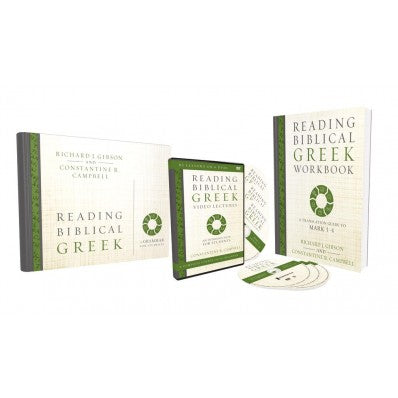by Richard J. Gibson and Constantine R. Campbell, adapted from their new book Reading Biblical Greek, available now, and part of the forthcoming Reading Biblical Greek Pack.
Meaning Is More Than the Meaning of Words
Reading biblical Greek involves more than substituting Greek words with equivalent meanings in English. There is much more to meaning than simply adding individual words together.
Consider this sentence:
The old man just said, “You missed the boat.”
It is possible to paraphrase this sentence:
The geriatric male recently explained, “You’re late for the ferry.”
However, since the meaning of a sentence is more than simply the sum of the words, this could be a complete misunderstanding. The sentence could consist of two idiomatic expressions. The old man is a common colloquial expression for my father. You missed the boat could be slang for you wasted the opportunity.
In that case:
My dad just said, “You blew your chance,” would be a much more accurate rendering of the intended meaning.
Deciding which paraphrase is more accurate is difficult when reading a sentence by itself. To clarify the meaning of man we would need to take account of the paragraph around the sentence, perhaps the whole text.
While we speak of “the meaning of a word,” meaning depends on the relationship between words within language units, that is: phrases, sentences, paragraphs, and whole documents, or “discourses.”
To understand the meaning of New Testament texts we need to take account of all the language units that contribute to meaning. The wider context enables us to limit the possible meanings of words.
For practical purposes, we begin with individual words when learning biblical Greek, but we need to remember that our aim is ultimately to be competent at reading whole texts. The exercises below illustrate the relationship between a whole text and individual sentences within it.
Reading English involves complex and sophisticated skills. So, the skills you already have will be foundational to reading Greek. Rather than learning to do something completely new, we will be building on your skills as a reader of English.
EXERCISES
- How good are you at recognizing the genre of a document from just a sentence or two? match the following genres with the quotes below.
- Which clues give the genre away?
a. Constitutional code
b. Sports journalism
c. Apocalyptic/Prophecy
d. Science textbook
e. Letter/Epistle
f. Fantasy
Genres
i. Hewitt has suffered another injury setback, citing an ailment in his left foot for his late withdrawal from the French Open.
ii. His heart pounded. The doorknob turned again. All he could do was wait, hoping the music box would soon stop before the shadows had a chance to find him.
iii. Photosynthesis is a process that converts carbon dioxide into organic compounds, especially sugars, using the energy from sunlight.
iv. Immediately after they shall be assembled in consequence of the first election, they shall be divided as equally as may be into three classes.
v. James, a servant of God and of the Lord Jesus Christ, To the twelve tribes scattered among the nations: Greetings.
vi. Then I saw a Lamb, looking as if it had been slain, standing at the center of the throne, encircled by the four living creatures and the elders.
— Richard J. Gibson and Constantine R. Campbell, Reading Biblical Greek
How To Use This Book
Optimize your learning of biblical Greek with the new Reading Biblical Greek book, and for the greatest savings grab the forthcoming Reading Biblical Greek Pack which contains the book, workbook, and video lectures.
By the end of the book and workbook, you’ll be reading and translating scripture from the Gospel of Mark!
You will find Reading Biblical Greek to be a clear and convenient guide, thanks to:
- its highly visual layout
- user-friendly explanations
- an apparent “minimalism” that cuts all clutter from lessons
Reading Biblical Greek will help you focus on the essentials you need to start reading the New Testament in its original language. This book’s distinctive approach has been shaped by lessons learned over decades of teaching biblical Greek to students, and long-time scholars of Greek are excited about this book’s release. Get the pack today.
What people are saying
“An interesting and innovative approach . . . providing a nice balance of theory, memorization, and practical exercises.” — Mark L. Strauss
“Informed by the latest studies in biblical linguistics and yet accessible and user-friendly for instructors and students alike . . . Sure to become the standard introduction to Greek grammar in seminaries and colleges across the world.” — Michael F. Bird

